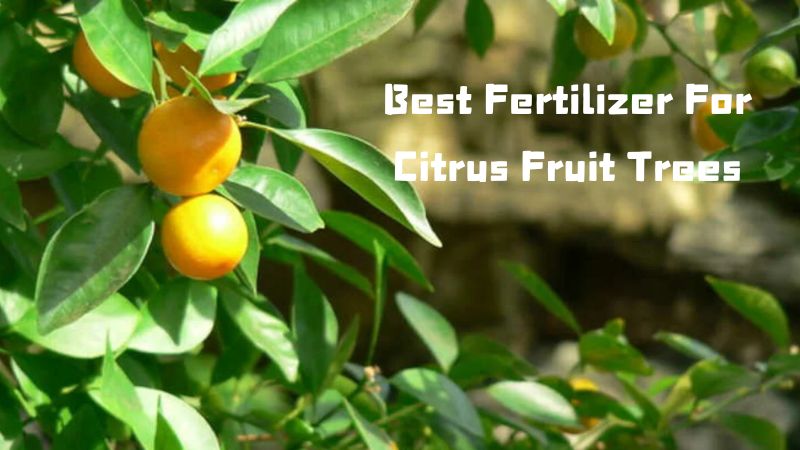Citrus fruit trees, such as oranges, tangerines, grapefruits, and lemons, require a special diet to grow healthy and produce high yields. Choosing the best fertilizer for citrus fruit trees is an important factor in helping citrus trees achieve that. This article will explore the best fertilizer for citrus fruit trees, factors to consider when choosing a fertilizer, and tips for optimizing tree growth. Explore now with Garden Creatives.
Why should you best fertilizer for citrus fruit trees?
Fertilization is an important part of caring for citrus fruit trees such as oranges, tangerines, grapefruits, and lemons. Fertilization not only helps plants grow healthily but also directly affects yield and fruit quality. Here are the main reasons why fertilizing citrus fruit trees is necessary:
Providing Essential Nutrition
Citrus fruit trees require a diverse range of nutrients for full growth. Fertilizers provide essential nutrients such as nitrogen (N), phosphorus (P), and potassium (K), as well as trace elements such as calcium, magnesium, and sulfur. These nutrients help plants:
Root Development: Phosphorus fertilizer promotes the growth of the root system, helping plants absorb water and nutrients more effectively.
Enhances Plant Growth: Nitrogen fertilizer supports leaf and stem growth, helping plants grow strongly.
Improve Fruit Quality: Potassium fertilizer helps strengthen plant resistance and improve fruit flavor and quality.
Optimize Productivity
Proper fertilization helps citrus trees achieve optimal yields. By providing adequate nutrients, plants can grow well and produce more fruit. This is especially important during the flowering and fruiting stages when the plant’s nutritional needs increase.
Improve Soil Quality
Fertilizer not only provides nutrients for plants but also helps improve soil quality. Organic fertilizers, such as compost or manure, help strengthen soil structure and improve aeration and water retention. This creates a favorable environment for plant growth.
Supplementing Nutrient Deficiencies
Soil for growing plants may lack some important nutrients due to long-term use or due to soil characteristics. Fertilization helps replenish nutrient deficiencies, ensuring that citrus fruit trees receive all the elements they need to grow.
Prevents Pests and Enhances Drought Tolerance
Citrus trees that are provided with adequate nutrition are better able to resist pests and harsh weather conditions. Fertilizers provide elements that help plants develop natural resistance, reducing the risk of disease and damage.
Enhances Growth and Creates the Best Conditions for Flowering and Fruiting
Fertilization helps provide necessary nutrients for flowering and fruiting. Phosphorus and potassium fertilizers are especially important during this period, helping plants develop healthy flowers and fruits, thereby producing higher fruit yields and better quality.
The best fertilizer for citrus fruit trees
Organic Fertilizer
Organic fertilizers provide nutrients from natural sources, helping to improve soil quality and support long-term plant growth. Some good organic fertilizers for citrus trees include:
Manure: Provides many nutrients and improves soil structure. However, it is necessary to compost thoroughly to reduce the risk of causing disease to the plant.
Green Manure: These types of manures, such as bean compost or straw manure, provide essential nutrients and improve soil aeration.
Compost: Made from decomposed organic matter, compost provides many nutrients for plants and helps the soil retain moisture better.
Mineral fertilizers
Mineral fertilizers provide essential nutrients quickly and effectively. Good mineral fertilizers for citrus fruit trees include:
Nitrogen fertilizer (N): Helps plants grow strongly and increases leaf growth. Nitrogen fertilizers such as urea and ammonium nitrate are popular choices.
Phosphorus (P): Supports root growth and enhances flowering and fruiting. Superphosphate and phosphoric acid are common phosphate fertilizers.
Potassium (K) fertilizer: Strengthens plant resistance and improves fruit quality. Potassium chloride and potassium sulfate are good choices.
Specialized fertilizers
Some special fertilizers are designed to provide specific nutrients to citrus trees, helping to improve growth and yield. For example:
Fertilizer containing Calcium: Helps prevent fruit top rot and improve fruit quality.
Fertilizers containing magnesium: Improve leaf growth and fruit color.
Factors to consider when choosing fertilizer
Nutritional ingredients
When choosing the best fertilizer for citrus fruit trees, you need to pay attention to the nutritional composition and N-P-K ratio (Nitrogen – Phosphorus – Potassium). Citrus plants typically require balanced ratios of these components to grow. When do you need to fertilize?
The timing of fertilization is also very important. Fertilizer should be applied at the appropriate time such as before the plant begins to flower and when the fruit is developing. Fertilizing too early or too late can affect plant growth.
Soil type
Soil type also affects fertilizer choice. Soils with low or high pH may require special fertilizers to balance the pH and provide necessary nutrients.
Tips to optimize crop growth
Soil test: Before fertilizing, test the pH and soil quality to determine the right fertilizer.
Apply the right amount of fertilizer: Use fertilizer according to instructions and do not fertilize too much because it can lead to environmental pollution and harm to plants.
Water thoroughly: After fertilizing, water thoroughly to help the plant absorb nutrients more effectively.
Observe the tree: Monitor the growth of the tree and adjust the fertilizer regimen if necessary to meet the tree’s nutritional needs.
Conclude
Choosing the best fertilizer for citrus fruit trees is an important step in ensuring healthy growth and high yields. By choosing the best fertilizer for citrus fruit trees and considering factors such as nutrient content, application timing, and soil type, you can optimize plant growth and get delicious berries. Use the advice and instructions in this article to care for your citrus fruit trees effectively and sustainably.





